Groundbreaking research is being conducted by members of the Vera Bradley Foundation for Breast Cancer Research Laboratories to prevent and detect breast cancer.
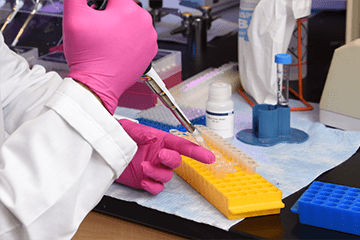 Ethnic and Racial Differences in Breast Cancer Diagnosis
Ethnic and Racial Differences in Breast Cancer Diagnosis
Breast cancer rates for African-Americans women are greater than in Caucasian women, especially for aggressive types of breast cancer. Hypotheses on why this occurs range from disparities in access to breast screening and quality care and social and physical stresses to biology of healthy tissue.
Hari Nakshatri, PhD, is leading an effort to determine if differences in the normal healthy breast tissue of African American and Caucasian individuals might reveal susceptibility to specific types of tumors. Early data suggests that African American women tend to have a higher number of healthy breast cells that can become more aggressive if cancer develops. Nakshatri is growing non-cancerous breast cells from different racial and ethnic groups and then exposing them to different carcinogens in his laboratory to trigger cancer. This work will determine pathways involved in the very early development of breast cancer and how they differ among racial and ethnic groups. This understanding could lead to new screening or prevention options, better tailored to a patient’s individual risk.
To determine if social and physical stresses play a role in tumor type, Brittney-Shea Herbert, PhD; Anna Maria Storniolo, MD; and Hiromi Tanaka, PhD; along with behavioral and social scientists, deployed a questionnaire to explore the correlation of cumulative stress (emotional or physical) to telomere length, an indicator of both stress and the onset of breast cancer. Telomeres are caps on the tips of chromosomes that preserve genetic integrity. As people age, the tips become shortened making individuals more susceptible to disease and death.
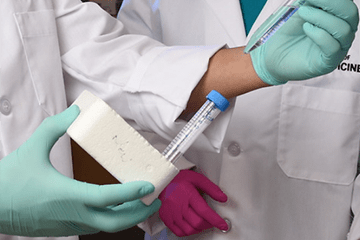 Risk Factors for Triggering Cancer
Risk Factors for Triggering Cancer
Scientists in the Vera Bradley Foundation for Breast Cancer Research Center at IU School of Medicine are exploring predictors of breast cancer, including obesity and inflammation.
Obesity is a known risk factor for breast cancer, and two trials underway at IU School of Medicine are aimed at explaining why. Together, Anna Maria Storniolo, MD and Tarah Ballinger, MD will soon be publishing the results of a study that compared obese women who take metformin, commonly prescribed for Type 2 diabetes, to obese women who do not take metformin. The goal of the study was to determine if women taking metformin reduce their risk for breast cancer. A separate bariatric surgery trial will provide data on the biologic changes that occur with substantial weight loss. Comparison of the results of these two studies will allow breast cancer researchers to develop new prevention strategies for obese women.
In a separate study, Natascia Marino, PhD, is comparing normal breast and cancerous breast tissue and has discovered signs of inflammation in normal tissue from people who went on to develop breast cancer. This inflammation is not present in tissue that isn’t cancerous. Her investigations focus on the earliest steps in cancer development, finding molecular changes long before the tissue looks abnormal to a pathologist. She has found signs of increased energy production through fatty acid metabolism and immune system dysregulation, which may signal the origins of how the breast cancer disease develops.
Similarly, the Nakshatri Laboratory is comparing normal, tumor-adjacent normal and tumor tissues, and its scientists have observed inflammatory changes in breast tissue adjacent to the tumor. Future studies will focus on validating the presence of inflammation. If verified, inflammation biomarkers will be identified and developed as breast cancer prediction tools.
Five national centers will collaborate with IU School of Medicine to take insights from these early studies at the school’s Vera Bradley Foundation Center for Breast Cancer Research and launch clinical trials that will ultimately include hundreds of thousands of women followed over many decades. The trial will capture changes in healthy breast tissue throughout the female lifetime, including before, during and after pregnancy and menopause, to understand how biological changes impact the development of breast cancer. The goal is to determine true breast cancer risk so that women can be properly assessed and managed.
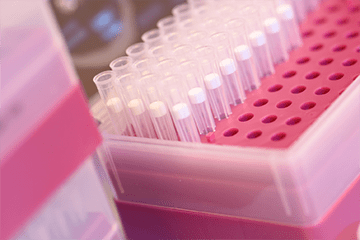 Diagnostic Imaging
Diagnostic Imaging
MRI is now commonly used to screen for breast cancer in women at very high risk, but it is not known if this technology is actually better at diagnosing the disease in average risk women. The procedure can take 45 minutes and cost $1,800, limiting recommendations for use to only those at highest risk. IU School of Medicine is involved in a large national screening trial to evaluate a new MRI technique that takes only 10 minutes and would cost about $400 in women with dense breasts. The study will also determine if MRI screening really needs to be done annually or could be offered less frequently with the same benefit.
In addition, IU School of Medicine is participating in a national trial—one of 120 centers involving 165,000 women—to see if 3D tomosynthesis is more effective than conventional 2D mammography in average risk women.
Mammogram x-rays do not see through dense tissue as well as they do through fat which may be a challenge to interpret mammograms with dense breast tissue. Additional screening tests, including digital and 3-D mammography, are in development for those with dense breasts. Unlike mammograms, none of the new tests prove to reduce the risk of dying of breast cancer. Now, Kathy Miller, MD, has recruited IU School of Medicine radiologists to join a national study evaluating a new MRI breast imaging method in individuals with dense breasts. In addition to the superior imaging, the technique can be completed in ten minutes – much faster than traditional MRI methods. The trial was approved by the National Cancer Institute in May 2017 and is enrolling patients.
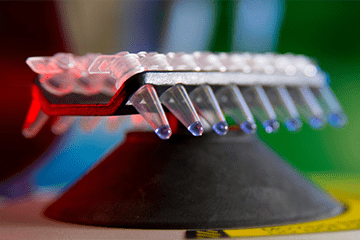 Treatment of Aggressive Tumor and Recurrent Disease
Treatment of Aggressive Tumor and Recurrent Disease
As part of the Vera Bradley Foundation for Breast Cancer Research Center, Jaeyeon Kim, PhD, is studying how people carrying hereditary BRCA mutations are prone to high-grade ovarian and triple-negative breast cancers. He developed a mouse model that offers a unique opportunity to deepen the molecular understanding of these equally dreaded diseases. In particular, he anticipates that learning about cancer initiation and early progression will be very helpful on many fronts like successful prevention, early detection and effective treatment.
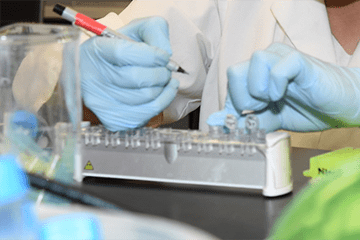 Metastatic Cancer Metamorphoses
Metastatic Cancer Metamorphoses
Early-stage tumors are biologically complex; however, once tumors metastasize to other organs, the complexity of the burgeoning cancer “system” is extraordinary. Hari Nakshatri, PhD; Ken Nephew, PhD; Yunlong Liu, PhD; and Kathy Miller, MD want to understand why breast cancer cells that spread to the liver and brain start acting less like breast cells and more like cells in a new environment. They are engineering these complex interactions and changes using computational and mathematical modeling. Their goal is to understand the metamorphoses that take place so that treatment can effectively target the process.
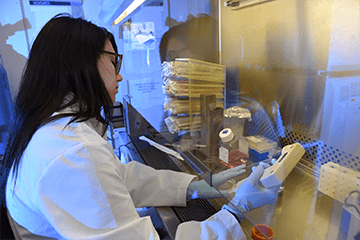 Patient Gene Signatures and Protein Markers for PI3K Inhibitors
Patient Gene Signatures and Protein Markers for PI3K Inhibitors
Treatments work best when drugs attach to biomarkers and kill complex breast cancer tumors. In the new era of personalized medicine, this is the goal. For instance, a new class of drugs called PI3K inhibitors was developed for estrogen positive (ER+) breast cancers; yet, patient response to this targeted drug has been disappointing. Drs. Hari Nakshatri and Sunil Badve have discovered a new gene signature and protein markers that can further define patients who may benefit from these drugs. Adding this important information and developing a new clinical trial is now under way.